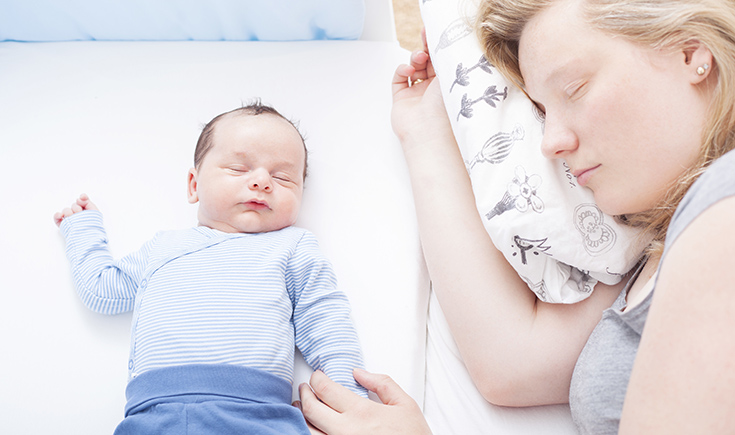

Talk of co-sleeping prompts a raft of different reactions and emotions, with much debate surrounding a turn of phrase that is ambiguous in its meaning.
Contrary to popular belief, co-sleeping and bed-sharing are not one in the same, although bed-sharing is a form of co-sleeping.
Co-sleeping itself refers to sleeping in the vicinity of your baby, including the World Health Organisation recommended practice of having baby sleep in its own cot or bassinet in the same room as his or her parents.
According to Dr Howard Chilton, author of Your Cherished Baby, co-sleeping in this way is an essential practice for the positive development and wellbeing of your baby.
Why is co-sleeping important?
“Mothers in particular have a sensitivity to their baby’s needs,” says Dr Chilton. Especially when sleeping close by and such closeness reduces the incidence of SIDS.
Babies and young children may find isolation at night-time harrowing, even threatening, according to Dr Chilton and may need constant reassurance.
Humans are a social species – we are designed to live in close knit groups. We are not solitary primates, as Orang-utans are. As a result, babies will naturally complain loudly if left alone and often this protest will bring the carer quickly. If a carer doesn’t appear, the protests become louder and more panicky as the baby searches more intensely for the source of his security.
Baby will have brief periods where he will fall silent as he reassures himself that his mother will return. Eventually he realises his plea’s will go unanswered and he starts to despair, intense misery overwhelms him and he finally falls silent. This is a situation for which he is unequipped to cope.
According to Dr Chilton, the result is that babies will fall into what’s known as ‘detachment’ as they attempt to cope with perceived abandonment.
These episodes form scars on the infant’s psyche and undermine the confidence they have in the people around them to offer reliability and protection. Such scars can influence how they respond to later events.
Conversely, studies have shown that when children have a secure attachment history, they tend to grow up emotionally mature, with an innate moral compass. They tend to lead, not follow. They are confident in their ability to deal with the world and have self-discipline.
“They also have the ability to love and be loved.”
Gentle Sleep Solutions
Lack of sleep is one of the most difficult aspects to becoming a new mother. New mums are also faced with an abundance of information and advice regarding how to get their baby to sleep more, which can leave them both confused and anxious.
In the first few weeks of their life, infants tend to sleep and wake regularly throughout the day, however they’ll eventually establish a day and night pattern.
But like adults, babies’ sleep patterns can vary and some have more trouble settling than others. How these issues are dealt with depends on primarily on age, and even within these groups there’s not always one fixed solution.
It’s important to remember, that although some babies will sleep through the night after just a few months, they are the exception to the rule – so as difficult as it can be to accept, babies are simply not designed to sleep for long periods of time.
Birth to three months
According to Dr Chilton, for newborn babies, issues are usually related to crying and fussiness rather than sleep problems. “In the first weeks, babies sleep patterns are mostly dictated by their stomachs,” says Dr Chilton.
Check for the following:
- Check that your baby is not hungry.
- Remember that some babies require another feed within an hour of the last one.
- Responding promptly to your baby’s distress leads to less frequent waking and disruptive crying patterns later on.
Dr Chilton also suggests trying to mimic an environment that reminds your baby of the womb, such as:
- ensuring he’s snugly contained or swaddled
- surrounding him with rhythmic noise
- lying skin to skin
- ensuring the environment is quiet, meditative and calm
If your baby is still unable to sleep and remains unsettled, calm her by wrapping her up and cuddling her to your chest until she settles. Place her in her cot and gently pat her bottom until she falls asleep.
For very unsettled babies, you may have to repeat the process several times over, but according to Dr Chilton, over time your baby’s sleep patterns will improve.
Three to six months
After three months of age, many babies have established some level of routine and are more able to spontaneously calm themselves.
By this stage too, many parents can tell the difference between a baby’s whinge as he settles himself or a distressed cry which needs attention.
Sometimes a gentle pat on the bottom is all that’s required, other babies rely on being cuddled and rocked to sleep.
If your baby is in the latter category, Dr Chilton suggests taking a transitional approach to help your baby sleep in his cot.
So when your baby is almost asleep, gently place him in the cot, with your arms still around him, slowly moving them away.
It’s also important to be aware of sleep cues and make sure your baby naps frequently throughout the day.























